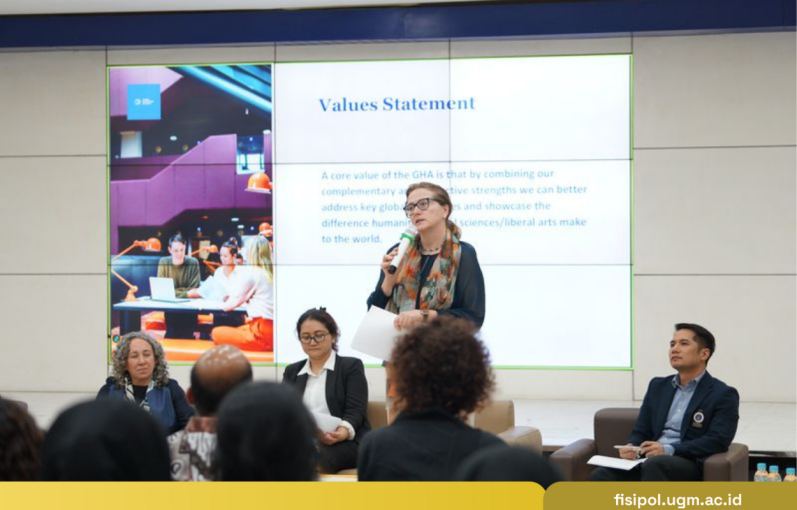
Yogyakarta, September 30th 2025 – The Global Humanities Alliance Roundtable Forum officially opened on Tuesday (9/30) with eight world universities, including the Faculty of Social and Political Sciences, Universitas Gadjah Mada. As one of the pioneers of the GHA, FISIPOL UGM hosted this year’s meeting, which was held in conjunction with the 70th anniversary of FISIPOL UGM.
The Dean of the Faculty of Social and Political Sciences at Universitas Gadjah Mada, Wawan Mas’udi, S.I.P., M.P.A., Ph.D., conveyed the importance of opening up opportunities for students to work in the international arena. The learning process cannot be limited to classrooms alone. Understanding various fields of study, especially social humanities, requires involvement in various social and cultural aspects. Through this initiative, it is hoped that brilliant ideas will emerge in response to global challenges. “We do have an agenda to become more engaged with the global community, and this is one of our strategies to facilitate students,” he said.



In line with this, Associate Professor Mitul Baruah from Ashoka University also said that global collaboration would help students understand the current global situation and challenges. The era of modernization has brought society new global challenges that affect all fields of science. This is especially true when discussing sustainability and climate change, which are also in line with the flagship research of the Faculty of Social and Political Sciences at Universitas Gadjah Mada.
The GHA Forum was initiated by eight universities, namely Ashoka University (India), Mahidol University (Thailand), Pontificia Universidad Catolica de Chile (Chile), Universitas Gadjah Mada (Indonesia), University of Manchester (UK), University of Melbourne (Australia), University of Nairobi (Kenya), and University of Toronto (Canada). With a mission to make a meaningful contribution to global social and humanitarian issues, GHA aims to develop education and research programs based on global issues.
The collaboration between global universities in the GHA is not without reason. According to Prof. Jaqueline Dutton from Melbourne University, the forum is intended to create two-way cooperation. The universities selected to join are not only assessed based on numerical quality indices, but also on their ability to provide learning based on knowledge and cultural wealth. “This forum is very meaningful for us. It is precisely these differences in background that make it interesting. The hope is that it will give rise to many formal collaborations that can enrich knowledge research,” she said.
Cooperation programs can be implemented in many programs, such as scholarships or student exchanges, for example. Dr. Anne Kamau from the University of Nairobi emphasized the importance of joint learning. This means that we do not learn individually, but rather learn from each other. Assistant Professor Narongdej Phantaphoommee from Mahidol University echoed this sentiment. One strategy for developing science is to expand research through interdisciplinary collaboration. “We are seeing rapid growth in social sciences and humanities studies. This is the result of opening the doors to synergistic research between disciplines to make an impact,” he said.
Another important aspect is that the GHA forum provides great benefits for students. Prof. Mariana Mota Prado explained that the University of Toronto has proven how important international exposure is for students. Currently, their learning programs have a system that adapts to various languages. This is certainly used to facilitate international students. A diverse environment can create an inclusive ecosystem and networking opportunities.
In addition to Toronto, the University of Manchester also promotes its student exchange program. According to Prof. Angelia Wilson, international cooperation proves that there are values that can be shared with others. “The world is facing more and more challenges that require us to form partnerships. This is no longer a competition. We must work together to produce knowledge,” she concluded.
The GHA Roundtable Forum focuses on three main issues, namely humanity, sustainability and climate change, and the decolonization of science. These three important agendas play a key role in facing the modern world. Through this collaboration, it is hoped that a future that is inclusive, diverse, and adaptive to all global changes will be created.
